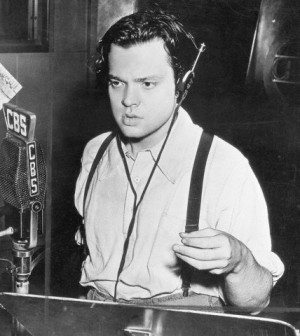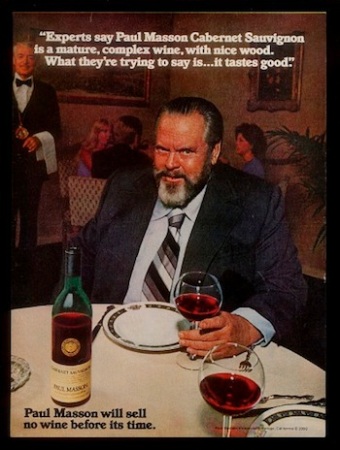Orson Welles was a media renaissance man.
As an actor, director, writer and producer, he experimented with several entertainment art forms. His work such as making the United States believe they were under alien attack to making a critical film about one of the most powerful men in America made Welles a controversial figure.
From acting on the radio, stage and films which included Citizen Kane, Touch of Evil, The Third Man and The Lady from Shanghai, Welles gained the reputation for being eccentric and difficult to work with.
In order to continue funding his projects, Welles had to take on lower brow jobs, including the Paul Masson wine commercials he is famously and humorously known for.
While there are hilarious anecdotes and outtakes came from these commercials, it’s not surprising that someone so immersed in all forms of arts and entertainment would be argumentative about comparing cheap wine to the text of “Gone with the Wind.”
Because he was involved in so many high level productions,he had a high standard of other media, down to the script for Paul Masson wine commercials and the text for a frozen peas advertisement.
Welles wasn’t cynical about doing the advertisements; he was reworking the text as he did with advertisements in the 1930s to help improve it, according to “What Ever Happened to Orson Welles?” by Joseph McBride.
In the 1930s and 1940s, Welles promoted Pan American Airlines and Lady Esther cosmetics on the radio.
Starting in 1978, Welles was hired as the Paul Masson spokesman. Masson later dropped him from the ads. “My Lunches with Orson” by Peter Biskind’s sites the reason for Welles telling a talk show host that he lost weight because he cut out snacks and wine.
“I’ve worked for advertising agencies all my life,” Welles is quoted in Biskind’s book. “In the old days in radio, you worked for them, because they were the boss, not the network. And I have never seen more seedier, about-to-be-fired sad sacks than were responsible for those Paul Masson ads. The agency hated me, because I kept trying to improve the copy.”
Paul Masson’s slogan at the time was “Paul Masson, we sell no wine before its time.” Each add compared the wine to a higher art form that also took several years to create, such as a Beethoven symphony.
In one such instance, a commercial was comparing Masson to a Stradivarius violin, which took three years to carve.
“Come on gentleman,” Welles is quoted in “Orson Welles: A Biography,” by Barbara Learning. “You have a nice, pleasant cheap little wine here. You haven’t got the presumption to compare it to a Stradivarius violin.”
In a famous incident, Welles was hired by Findus Frozen Food in 1970 and was recording a voiceover for a frozen peas ad. During the recording, Welles argued about the text, lost his temper and finally walked out (Read the transcript below). However, though Welles sounds like a prima dona in the session, the technicians said he was very kind to them during the recording, according to “VO: Tales and Techniques of a Voice Over Actor” by Harlan Hogan.
Welles didn’t just try to change the text, but he also sent instructions on how he would like to be photographed. He arrived for a Masson commercial shoot with his makeup already applied on his own.
He also sent instructions to the cameramen: he liked the brooding look he had when the camera was positioned slightly above his eyes so he had to look up a bit at it, and he liked the hard light three-quarters on the left side, according to Learning’s book.
While this sounds like star behavior, his requests aren’t surprising since he is familiar with filming and lighting. However, the camera men would have Welles’ requests set up for when he arrived. Once he was satisfied, the director would quietly change it to how he wanted it, according to Learning’s book.
Through the years, these advertisements have made Welles the butt of jokes and were the lighter, more humorous side of his career. As the constant professional and perfectionist, Welles viewed the piddly commercials the same as he would one of his own films: he wanted it to be well made. Welles didn’t want to appear out of character with the persona that he had crafted since the 1930s.
Transcript of the frozen peas ads (Source: VO by Harlan Hogan):
Orson Welles: “We know a remote farm in Lincolnshire, where Mrs. Buckley lives. Every July, peas grow there.” Do you really mean that?
Director 1: Uh, yes, so in other words, I—I—I’d start half a second later.
Welles: Don’t you think you really want to say “July” over the snow? Isn’t that the fun of it?
D 1: It’s—if—if you can (laughs) if you can make it almost when that shot disappears, it’ll make more—
Welles: I think it’s so nice that—that you see a snow-covered field and say “every July peas grow there”. “We know a remote farm in Lincolnshire, where Mrs. Buckley lives. Every July, peas grow there.” We aren’t even in the fields, you see? (pause) We’re talking about them growing and she’s picked them. (clears throat) What?
D 1: …in July.
Welles: I don’t understand you, then. When must—what must be over for “July”?
D 1: Uh, when we get out of that snowy field—
Welles: Well, I was out! We were onto a can of peas, a big dish of peas when I said “in July”.
D 1: Oh, I’m sorry, Orson.
Welles: Yes, always. I’m always—past that!
D 1: You are?
Welles: Yes! Wh—that’s about where I say “in July”.
Director 2: Can you emphasize a bit “in”? “In July.”
Welles: Why? That doesn’t make any sense. Sorry. There’s no known way of saying an English sentence in which you begin a sentence with “in” and emphasize it. Get me a jury and show me how you can say “in July” and I’ll go down on you. That’s just idiotic, if you’ll forgive me by saying so.
D 2: (indistinct chatter)
Welles: That’s just stupid. “In July”? I’d love to know how you emphasize “in” in “in July”. Impossible! Meaningless!
D 1: I think all they were thinking about was that they didn’t want to—
Welles: He isn’t thinking.
D 1: Orson, can we just do one last time—
Welles: Yeah.
D 1: …and it was my fault. I should—I said “in July”. If you could leave “every July”—
Welles: You didn’t say it. He said it.
D 1: …I said “every July”.
Welles: Your friend. “Every July”?
D 1: …so after this shot…
Welles: No, you don’t really mean “every July”?
D 1: …it is, but it’s…
Welles: But that’s—that’s bad copy. It’s in July. Of course it’s every July! There’s too much directing around here.
Check out the Comet Over Hollywood Facebook page, follow on Twitter at @HollywoodComet or e-mail at cometoverhollywood@gmail.com



Great post!
LikeLike
I’ve watched the commercials on Youtube for years and I find them extraordinarily funny mixed with a bit of pathos. Ultimately, you end up enjoying Welles more for the insistence of having his own way with these ads – not that he makes them better, he just made them Orson.
“Muaha! The French. Champagne has always been celebrated for its excellence. There is a CALIFORNIA champagne by PAUL MASSON. INSPIRED! by that same French excellence. It’sFermentedInTheBottle and like the best French. Champagne. It’s VINTAGE DATED. So Paul Masson… ” 😀
I die laughing every time.
LikeLike